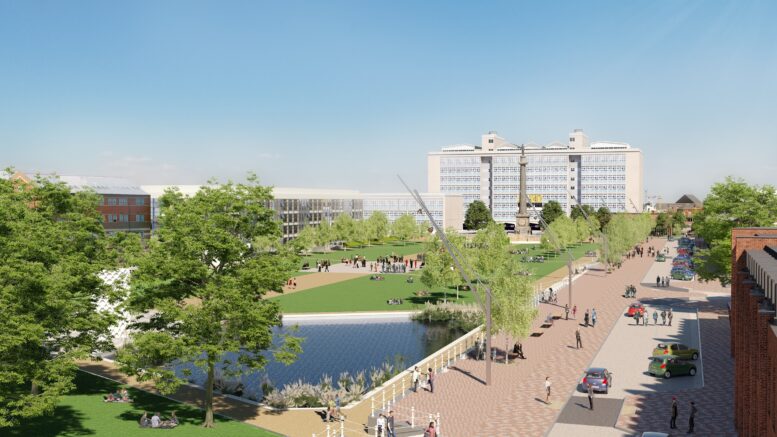Work begins today (Monday 14 February) on the £11.7m redevelopment of Queens Gardens in Hull.
The first stage of the redevelopment will include the refurbishment of the Rose Bowl Fountain and the removal of the bandstand which is being relocated to Pickering Park.
The first stage of works are due to be completed in June 2022. The works are being carried out in two phases, with completion expected late 2023.
Councillor Daren Hale, leader of Hull City Council, said: “Today marks the start of this fantastic project that will transform our city centre and play an important role in our future prosperity.
“I am pleased we are starting near the Rose Bowl, much improving accessibility for all residents and visitors to this much-loved space near the fountain.

The ponds will be refurbished to support the city centre’s flood defences.
“Queens Gardens is a fantastic urban green space but it is in desperate need of redevelopment and investment. I am particularly excited about the planting of already established mature rare trees as part of this development, which will futureproof it to react to challenges posed by climate change.
“The Queens Gardens redevelopment, alongside the new urban park we are creating as part of the Albion Square development, demonstrates our commitment to, and value of green spaces.”
The first stage of works will see the planting of the first Metasequoia tree – a species of conifer known as redwoods. Metasequoia trees are fast-growing and can grow to 50 metres in height.
The tree is one of the dozens of trees, of various size and majority, that will be planted during the project.
This includes the planting of new, feature trees that can cope with changes in climate and native trees to replace those that are in a poor condition or require removal due to the design of the park or the undertaking of essential structural repairs.

Queens Gardens will include artistic installations as well as new seating areas.
For every tree removed, three trees will be planted in the gardens and in other locations across the city centre.
Trees will be replaced and planted providing appropriate replacement species, improving foliage and providing a good source of nectar and pollen for birds, bees and insects to enhance biodiversity. The trees will also add seasonal colour along the perimeter of the gardens, complimenting the surrounding colours and architecture of buildings.
Some of the trees within the planting scheme are on the endangered species list.
The project’s contractor, C R Reynolds, is commencing the first stage of works on Monday 14 February.
The first stage of works include conservation and consolidation works to the Rose Bowl Fountain to improve the overall visual appearance of the fountain within the garden setting. This will include upgrading the water systems, water fountains and decorative lighting.
Demolition of the café building will also take place during the first stage of the works, with the removal of the Robinson Crusoe plaque which will be relocated elsewhere within the city centre.
The Queens Gardens bandstand will also be relocated to Pickering Park.
The Queens Gardens project includes the improvement of accessibility and visitor flows, delivery of structural repairs through rebuilding the perimeter walls, introduction of bespoke pieces of public art, improvement of biodiversity and the regeneration of a much-loved open space.

The gardens will feature new artistic installations, such as this proposal from Katayoun Dowlatshahi which would appear in the centre of the park. The design references historic voyages of ships that have sailed from Hull, the navigation equipment and charts that they used and the species that they hunted and fished.
The project will make the gardens fit for purpose, futureproofing the space and its ability to host large-scale events. The history of the gardens will be incorporated in its design, reconnecting it with the origins of the space as a former dock.
The project includes the introduction of various art installations and the creation of a large and flexible event space.
The redevelopment will incorporate modern, eco-friendly features including electric charging points for taxis and the introduction of plants and trees to increase the gardens’ biodiversity.
The plans for the gardens are sympathetic to those of Sir Fredrick Gibberd, one of England’s most distinguished 20th-century architects who redesigned the gardens in the 1950s.
The Queens Gardens refurbishment is an integral part of the Hull: Yorkshire’s Maritime City project as it will link the Hull Maritime Museum to the North End Shipyard – which will be the new home of the historic Arctic Corsair. The shipyard is being transformed into a new visitor attraction, which will tell its rich story for the first time.



